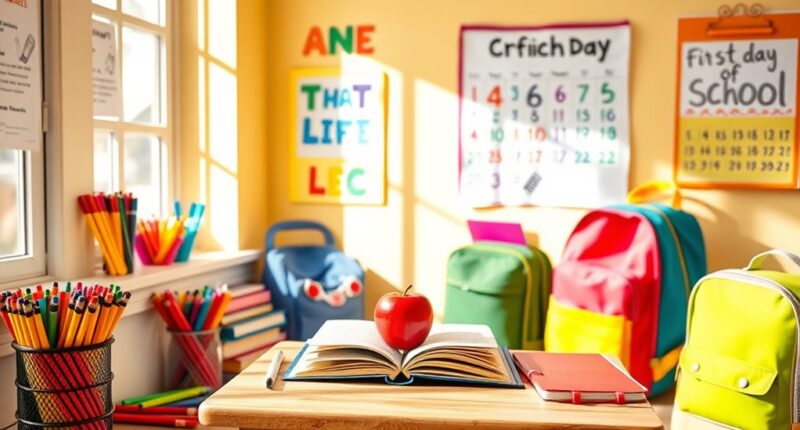Preparing for the next school year is essential for your child’s development. You can establish routines that create stability, which helps reduce anxiety. Focus on enhancing academic readiness through foundational skills like literacy and numeracy. It’s important to foster social and emotional skills for better classroom performance. Communication with teachers builds collaboration, while a positive attitude towards school boosts motivation and resilience. Uncover more strategies to support your child’s adjustment into the new school year.
Key Takeaways
- Establish consistent daily routines to provide stability and clarity for children as they transition to the new school year.
- Focus on enhancing foundational skills in literacy and numeracy to ensure academic readiness for learning success.
- Foster social and emotional skills through participation in programs that promote self-awareness and relationship-building.
- Maintain effective communication with teachers to create a supportive environment and address any academic challenges.
- Encourage a positive attitude towards school by recognizing individual strengths and promoting family involvement in the learning process.
Establishing Routines for Stability

When you establish routines for your child, you’re creating a sense of stability that can greatly impact their emotional well-being. Routines help them feel secure in a predictable environment, reducing anxiety and uncertainty.
By consistently following set schedules, your child learns to regulate their emotions better, leading to fewer tantrums and meltdowns. Additionally, these routines promote healthy habits like personal hygiene and regular sleep patterns.
They also support cognitive development through structured activities such as reading. You’ll notice that predictable routines minimize power struggles by setting clear expectations.
Enhancing Academic Readiness

To enhance your child’s academic readiness, it’s important to focus on building foundational skills that support their learning journey. Early assessments can predict future success, so consider using tools like the Kindergarten Readiness Assessment (KRA) to gauge their progress.
Access to quality early education and supportive family environments plays a significant role in this process. Encourage your child to develop essential literacy and numeracy skills, as well as self-regulation, which is critical for staying focused in school.
Additionally, make sure they’ve opportunities for physical activity to build motor skills. Finally, manage screen time wisely by choosing educational content, fostering digital literacy, and guiding your child in using technology positively to enhance their readiness for the upcoming school year.
Fostering Social and Emotional Skills

Fostering social and emotional skills in your child is essential for their overall development and success in school. Research shows that participation in social and emotional learning (SEL) programs can greatly enhance your child’s academic performance and well-being.
By mastering core competencies like self-awareness and relationship skills, your child will be better equipped to handle stress and build positive relationships. These skills not only lead to improved grades and attendance but also create a healthier classroom environment.
Studies indicate that children engaged in SEL report fewer behavioral problems and emotional distress. As a result, you’ll notice your child approaching challenges with optimism and perseverance, laying the foundation for long-term success in both school and life. Additionally, fostering these skills aligns with the lifespan perspective which emphasizes continuous growth throughout development.
Practical Preparations for a Smooth Transition

Building on the social and emotional skills your child has developed, practical preparations can help ease their entry into the school year. Establish consistent daily routines to clarify expectations and reduce anxiety.
Utilize visual schedules to provide clear imagery of daily activities, especially for younger children. Morning meetings can preview the day and prepare your child for changes ahead. Incorporate shift cues, like timers or songs, to signal upcoming changes. Additionally, effective communication can help children articulate their feelings and concerns about the new school year. Understanding and managing emotional dysregulation can further enhance their ability to cope with transitions.
Engage your family in the process; involve them in activities like school supply shopping. For instance, establishing a bedtime routine can also contribute to a child’s overall readiness by promoting better sleep habits. Finally, create a supportive environment where children feel safe to express their feelings. Additionally, fostering emotional well-being through positive interactions can significantly enhance your child’s readiness for the new school year.
These strategies will foster confidence and make the shift smoother, setting the stage for a successful school year.
Effective Communication With Teachers

Effective communication with teachers is essential for your child’s success, as it creates a collaborative environment where both parents and educators can share insights and address concerns.
Regular parent-teacher conferences are key to discussing progress and challenges. Encourage open dialogue, promoting two-way communication to foster inclusivity.
Utilize technology like emails and messaging apps to stay updated on classroom activities and assignments. Frame conversations positively, focusing on solutions and growth opportunities.
It’s vital to clearly define roles in supporting your child’s education. Practice active listening and acknowledge each other’s inputs to strengthen the partnership. Additionally, being aware of common errors in communication can enhance your interactions with teachers and lead to better outcomes for your child.
Mental Preparation for New Experiences

As your child faces new experiences, preparing them mentally can make a significant difference in how they adapt. Start by discussing upcoming changes well in advance to reduce anxiety about the unknown.
Establishing a regular routine provides a comforting structure, helping your child feel secure. Familiarize them with new environments, like schools, through tours or playdates, which can ease their shift. Research shows that consistent routines can significantly improve children’s emotional regulation and adaptability. Additionally, regular outings to dog training classes can enhance social skills and confidence in new settings. Engaging in play activities can also help your child develop essential social skills and emotional resilience as they prepare for new experiences.
Encourage open dialogue about their feelings, allowing them to express concerns and questions. Teach coping strategies for managing stress and anxiety, fostering resilience. Additionally, consider using age-appropriate books to help them understand and process the changes they are facing.
Finally, gradually promote independence by setting achievable goals, so your child builds confidence. With your support, they’ll develop the skills needed to navigate new experiences successfully.
Encouraging a Positive Attitude Towards School

To foster a positive attitude towards school, it’s essential to create an environment where your child feels supported and valued.
Encourage open communication at home, allowing them to express their feelings and thoughts about school. Help them set realistic academic goals and celebrate their achievements, no matter how small, to build their confidence.
Foster open communication and celebrate small achievements to build your child’s confidence and support their school journey.
Engage in discussions about subjects they find interesting, emphasizing their relevance and future applications. Promote positive peer relationships by facilitating friendships and group activities.
Encourage physical activity and healthy eating to boost their overall mood. Ultimately, be a role model by demonstrating a positive attitude towards learning and facing challenges, showing them that resilience can lead to success. Additionally, emphasize the importance of self-worth in their personal development, as it can significantly influence their motivation and attitude towards school.
Frequently Asked Questions
How Can I Help My Child With Homework Struggles?
To help your child with homework struggles, create a quiet, well-lit study space free from distractions.
Set a consistent homework schedule to build routine and minimize procrastination.
Encourage short breaks and offer snacks to recharge.
Communicate regularly with teachers to understand expectations and support your child’s learning.
Foster independence by allowing them to solve problems on their own, and always provide positive reinforcement to boost their confidence and motivation.
What Should I Do if My Child Refuses to Go to School?
When your child refuses to go to school, it’s like a storm cloud hovering over their sunny day.
Start by opening a calm dialogue; listen to their fears without judgment. Connect with teachers to understand any underlying issues, and create consistent morning routines to ease anxiety.
How Can I Identify My Child’s Learning Style?
To identify your child’s learning style, start by observing them during play and different activities.
Notice how they engage with various materials—do they prefer visuals, sounds, or hands-on experiences?
Try using different teaching methods, like diagrams, audiobooks, or hands-on projects, and see which sparks their interest.
You can also take learning style quizzes together to gain more insight.
Tailoring your approach to their style can greatly enhance their learning experience.
What Are Signs of School-Related Anxiety in Children?
Imagine a storm brewing inside your child, where worry clouds their mind. Signs of school-related anxiety often manifest as physical symptoms like stomachaches or headaches.
You might notice fearfulness, irritability, or intense panic in their eyes. Behavioral changes, like refusing to attend school or throwing tantrums, can also signal distress.
If they cling to you or claim to be sick, it’s time to address their emotional turmoil and support them through this challenging experience.
How Can I Support My Child’s Friendships Outside of School?
To support your child’s friendships outside of school, encourage them to participate in extracurricular activities that match their interests.
Organize playdates with friends to strengthen those bonds, and engage in community events where they can meet new peers.
Model good social behaviors and discuss the value of friendships.
Finally, help them navigate changes in friendships by being open to their feelings and encouraging adaptability in new social situations.
Conclusion
As you gear up for the new school year, remember that nearly 70% of a child’s academic success is influenced by their social and emotional skills. By establishing routines, enhancing readiness, and maintaining open communication with teachers, you’re setting your child up for a smooth shift. Encourage a positive mindset and prepare them mentally for the experiences ahead. With your support, they can thrive in their new environment and embrace the journey of learning with confidence.









